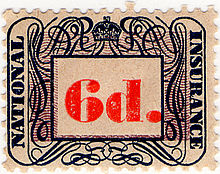
The National Insurance Act 1946 (9 & 10 Geo 6 c. 67) was a British Act of Parliament passed during the Attlee ministry which established a comprehensive system of social security throughout the United Kingdom.
The act meant that all who were of working age were to pay a weekly contribution. If they had been paying National Insurance, mothers were to be entitled to an allowance (of 18 weeks)[1] for each child as well as a lump sum when the child was born. The act however excluded married women. The weekly contributions meant that benefits including sickness benefit and unemployment benefits were able to be offered. Pensions were to offered to men and women at ages 65 and 60 respectively.[2]
Background
Attlee had campaigned hard in his campaign leading up to the 1945 election for the creation of the welfare state. When elected, he and his administration and adopted Beveridge proposal from 1944 to keep to his manifesto promise.[1]
Significance
According to the historian Kenneth O. Morgan, the Act constituted "a measure which provided a comprehensive universal basis for insurance provision that had hitherto been unknown".[3]
See also
- UK labour law
- Welfare state
- National Insurance Act 1911
- National Insurance Act 1965 (c. 51)
- Social Security Contributions and Benefits Act 1992
- Timeline of pensions in the United Kingdom
References
- ^ a b "1940's Origins of the Welfare State". The National Archives. Archived from the original on 23 October 2023. Retrieved 9 August 2021.
- ^ "The National Insurance Act 1946". Policy Navigator. Retrieved 9 August 2021.
- ^ Taylor, David, Mastering Economic and Social History
External links













